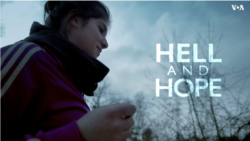In 2014, when Badeeah Hassan "Baazi" Ahmed was kidnapped by Islamic State terrorists from the village of Kocho in Iraq's Sinjar province and taken to Aleppo, Syria, she pretended her baby nephew was her son.
The Yazidi teenager's status as a "married woman" may have initially protected her in IS's sex slave market.
"They called us by name in the evening. They would tell the girls to be prepared. Someone would come in the morning and take them. They took all of them, but left my nephew and me," Ahmed said.
When she was eventually taken by an American named Abu Abdullah al-Ameriki, she was initially expected to cook and clean.
The Yazidis — a Kurdish-speaking minority with its own non-Muslim faith — play an outsized role in IS's legacy of terror. Ahmed's village suffered greatly.
"Evidence suggests that hundreds of villagers from Kojo [Kocho] — men, adolescent boys and women perceived to be past childbearing age — were murdered by ISIL fighters in August 2014, while more than 700 women and children were abducted," according to the United Nations.
Working with the U.N., the Iraqi government began exhuming the first mass grave in Kocho on March 15. Sixty-nine mass graves have been discovered in Sinjar province, where 600,000 Yazidis lived before IS swept through.
But the numbers don't really tell the horrific story the way Ahmed and other Kocho survivors can. Their devastating personal histories are contained in the VOA documentary Hell and Hope.
They are among the relatively few villagers who escaped from IS, and are part of an even smaller group that was taken to Germany in a program called Air Bridge Iraq.
The home ministry of the German state of Baden Wurttemberg brought more than 1,100 Iraqi survivors to Germany, hoping to give them, including some Yazidis, a better life.
"We took only those that couldn't be helped there. If they were in good condition or if their family structure was intact, then of course we said, 'Stay there.' We only took the most severe cases," Dr. Michael Blume, the state's Minorities Division director, told documentary maker Amish Srivastava.
Ahmed's four brothers were killed by IS on the day she was kidnapped, including the father of her nephew, Evin. Her mother placed Evin in Ahmed's care just before being taken away by IS. Her fate is unknown.
Al-Ameriki
Ahmed learned from al-Ameriki that he had been a teacher in the United States. Though he claimed not to have a family, one day she caught him talking to his American wife via Skype.
His family did not stop him from announcing he was going to marry Ahmed.
"I cried and refused. I told him I had a son, and I was married, and this should not happen," Ahmed said. "He told me all the girls would get married, except for the pregnant ones."
When Ahmed claimed to be pregnant, al-Ameriki took her to a doctor.
"After a few days, he told me that I lied. He took me to his room by force and raped me."
A first escape attempt failed when Ahmed and Evin inadvertently sought help at an IS headquarters. They were returned to al-Ameriki, who beat them and separated them for a week. But then, another opportunity arose.
"One evening, he came and asked if we needed anything because he was going to fight a war in Kobani. Later, we broke the door with a hammer and waited until morning, when we went out," Ahmed said.
Dressed in black, they found a pay phone and called Ahmed's relatives, who sent someone to get them.
Five years later in Turbingen, Germany, Ahmed has only recently stopped seeing a psychiatrist every week.
'We will not forget'
Hell and Hope features several stories as heart-rending as Ahmed's.
Salwa Khalaf struggled with suicide:
"They came from time to time to buy some of the girls. Every time they came, we knew that some of our sisters or friends would be taken. ... We held each other's hands, but they separated our hands by hitting us with wood sticks and pulling our hair."
Salina Haji Bashar was forcibly separated from her sister, Lamiya:
"The man who chose Lamiya refused to take me. They left me there. I cried and ran after her, but it did not help. They took her. Lamiya was doing the same, saying, 'I am not leaving without [my] sister.' But they dragged her by her hair [and] closed the door."
Jilan Ismail was 12 when she was kidnapped:
"The sheikh took me to his family for about a week. Whenever he wanted, he came and did what he wanted to do with me in front of his family."
Poignantly, she added, "What he took from me, I am sure I will not get it back."
Yet for these girls, a good life is still possible. They are finding their way in Germany.
Ahmed is preparing for her wedding. She has a book coming out and is studying to be a nurse.
Many others are still missing.





